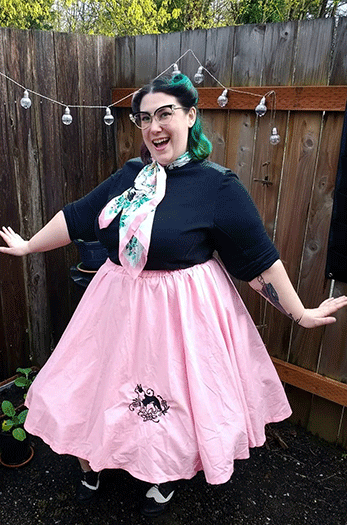
A committee of feminist faculty members unanimously selected Celeste Reeb as the recipient of the 2019-20 Jane Grant Dissertation Fellowship, awarded annually by the UO Center for the Study of Women in Society to support a PhD candidate already advanced to candidacy in writing their dissertation on women and gender.

Reeb’s work on her dissertation topic — “Closed Captioning: Reading Between the Lines” — was described by Priscilla Peña Ovalle, a member of her dissertation committee and head of the Department of Cinema Studies, as “a fascinating scholarly project that has real-world implications on the d/Deaf and Hard of Hearing audiences it serves.” English professor Elizabeth Wheeler, another member of Reeb’s dissertation committee and the director of the Disability Studies minor, describes Reeb’s work as “brilliant” and “groundbreaking.”
In an abstract describing the topic, Reeb wrote:
Closed Captioning (CC) is a series of rhetorical choices that are influenced by concepts of normalcy. Examining CC exposes the way language attempts to contain, mark, and categorize bodies based on gender, disability, sexuality, and race. Sound scholars have begun unpacking the ways that sound constructs views of these categories, therefore this project adds onto this work by examining how CC enforces these patterns in new ways since CC makes visible in text what is implied by sound. Most academic work done on CC focuses on its technological aspects, legislation, or scientific studies which have ignored the role CC plays in people’s daily lives. By doing so, film, television, and media studies have ignored communities who utilize CC. This dissertation brings together multiple fields, such as disability studies, ethnomusicology, queer theory, sound studies, and media studies to unpack the ideological work influencing closed captioning. In doing so, this dissertation works with those who utilize closed captioning to advocate for a better quality of CC. From using early film trade journals archives to outline societies views of captions and d/Deaf and Hard of Hearing film audiences, to participating in fan captioning communities online, to close analysis of film, television, and porn, to creating interactive online components showing captions role for horror and comedy films, this dissertation utilizes a wide array of methodologies showing how CC can be approached as a field of study. A highly interdisciplinary field of study that challenges conceptions of audiences, sonic participation, language, and normalcy.
“If any discourse can be described as hidden in plain sight, it is closed captioning,” Wheeler said. “Although available to any viewer with the touch of a button, captioning serves a marginalized community: d/Deaf and hard of hearing people. Captioning is widely assumed to be neutral, non-ideological language that simply transcribes the dialogue and sounds on screen. In the scholarship of Celeste Reeb, however, the rhetorical choices of this overlooked discourse speak volumes about dominant notions of gender, sexuality, ability, and race.”
Reeb has already been awarded the English department’s 2019 Rudolf Ernst Award, a fellowship given annually to a single PhD candidate. Wheeler commented that Reeb’s dissertation “will revolutionize her primary field as well as a few secondary ones.”
The Jane Grant Dissertation Fellowship comes with a stipend of $12,000. The award also includes a tuition remission grant from the Dean of the Graduate School, and a health insurance stipend from CSWS. It is named for activist and journalist Jane Grant, a co-founder of The New Yorker and wife of CSWS benefactor William Harris. CSWS has awarded it annually since 1984.
CSWS also awarded nine graduate student research grants for a total of almost $25,000, and seven faculty research grants for a total of more than $40,000. In all, CSWS awarded more than $77,000 for the 2019-20 round of research support for scholarship on women and gender. See also: https://csws.uoregon.edu/2019-20-csws-research-grant-awardees/

